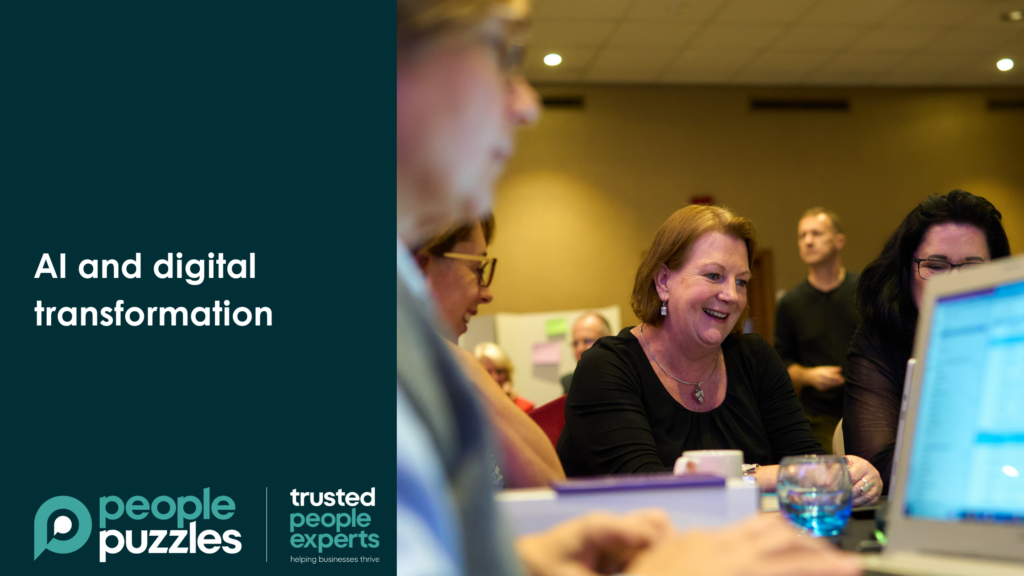There is little doubt that AI and digital transformation will significantly reshape recruitment strategies and processes over the coming years – even now, approaches, platforms and best practice are shifting rapidly.
As technology continues to evolve, businesses will need to adapt to stay competitive in attracting top talent. But that doesn’t mean rushing to adopt untested tools and approaches that could do more harm than good. It’s important to remain focused on your own unique goals, your company values and your strategy for the future.
How will AI change recruitment?
- Efficiency and automation: AI can automate repetitive tasks, such as screening CVs and scheduling interviews. By using algorithms to match candidates’ skills and experiences with job descriptions, businesses can drastically reduce the time and effort required to find the right fit.
Watch out for: There are already widespread concerns about bias in recruiting and AI is no protection against it – in fact, some say that it actually reinforces existing biases and can be more unfair in screening than humans. Exercise great care and ensure you have human involvement to sense check what’s happening – don’t rely solely on technology.
- Data-driven decision making: AI-powered recruitment tools can analyse data to predict candidate success, assessing not only technical skills but also cultural fit. This predictive analytics approach could lead to better hiring decisions, reducing turnover and increasing employee satisfaction.
Watch out for: Again, be aware of the potential for bias if relying heavily on recruitment. Being data driven is great, but human judgement and intuition also plays a big part. Be aware also that simply “fitting” existing culture isn’t always the way forward – sometimes culture stretch is actually more beneficial if you are trying to build truly inclusive environments or bring about transformational change.
- Improved candidate experience: AI can personalise the recruitment experience by providing timely feedback, automating communications, and creating seamless application processes. Chatbots, for example, can engage candidates instantly, keeping them informed and improving their overall experience with the company. There are therefore big advantages for consistency and timeliness.
Watch out for: An over-reliance on AI could remove the human connection from the recruitment process altogether. People are drawn to people and cultures where they will feel valued and heard. Relying on a purely tech-supported recruitment process could be a turn-off for potential candidates looking for a more human experience – so deploy your tech with care and find a balance that works for you and your candidates.
- Wider talent pool: Digital transformation enables businesses to access a global talent pool through online platforms and remote work tools. Virtual interviews and AI-assisted assessments will make it easier to recruit candidates from diverse locations, ensuring businesses have access to the best talent regardless of geography.
Watch out for: If you are going down this road, make sure your day-to-day working practices also support remote or hybrid working and that it is a realistic and long-term way of working for your business, or you will risk losing people later on or appearing inconsistent (as well as wasting time and money on impractical applications) Also, make sure you have the support you need if hiring from overseas and are fully up to speed with the required employment law regulations for that region. Again, be aware too of potential bias – there’s no point attracting a wider geographic talent pool if you’re inadvertently excluding most of them through AI bias or rigid exclusion parameters.
Our top tips
- Invest in the right tools: Research and invest in AI-driven recruitment platforms that suit your company’s needs, values and strategic vision. Many affordable, scalable tools are available specifically for SMEs. And while there are lots of efficiencies to be had, it’s worth taking a judgement on what’s really necessary for your size and scale of operation (both now and in the future)
- Upskill HR capability in your teams: Ensure your HR team is trained in using AI tools and data analysis to maximize the technology’s potential, and to be fully aware of the potential pitfalls. AI can’t replace human judgment entirely, but it can augment decision-making when used effectively.
- Focus on your employer brand: As digital transformation accelerates, companies with strong online reputations and modern digital infrastructure will attract top talent. See our article on building your business brand for more details.
There are many advantages in adopting AI and digital transformation for meeting the needs and complexities of recruitment. We are already using video screening, psychometric assessment and many more AI-enhanced tools to improve the consistency and efficiency of recruitment, but always exercise careful judgement and keep candidate experience front of mind. AI might be powerful but it’s not human – unlike the people you’re looking to attract.


